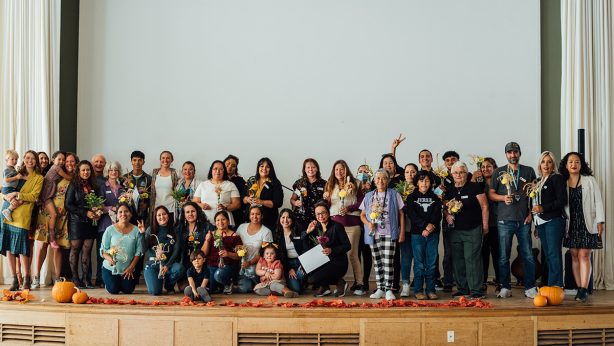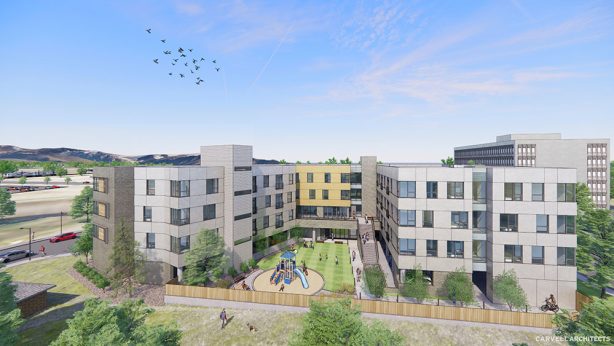ULC Staff Participate in Three Panels During Rocky Mountain Land Use Institute’s Annual Conference
Urban Land Conservancy’s (ULC) Aaron Miripol, Christi Smith and Erin Clark attended Rocky Mountain Land Use Institute’s (RMLUI) annual conference on Western Places & Spaces earlier this month. Created in 1992 as an interdisciplinary educator of lawyers, planners, policymakers and professionals in the environmental, land use and real estate fields – RMLUI’s mission is to bring sustainable development to the Western region of the U.S. through innovative research, education and professional development programs. Members of ULC’s leadership team spoke on three discussion panels, focusing on issues concerning land use and affordability in Colorado.
Setting the Stage: Diagnosing the Problem
The first panel focused on the nature and primary causes of the Front Range affordability crisis. Panelists included Aaron Miripol, ULC President and CEO, Jennifer Newcomer the Director of Research at Gary Community Investments and Kristin Hyser the Community Investment Program Manager for the City of Boulder. Heidi Aggeler the Managing Director and Founder of Root Policy Research moderated the panel.
Newcomer stressed the importance of reducing housing costs for families as consumer spending is directly impacted when families are rent or mortgage burdened (defined as spending more than 30% of their income on housing costs). The sales tax base, in particular, is affected by a decline in consumer spending. Local economies want people to spend their money, but prohibitive rents are a massive roadblock for low-income family consumer spending. Newcomer advocated to increase the supply of strictly affordable housing units to meet the demand. Reducing the cost of construction is a topic woefully underdiscussed, and Newcomer highlighted the need to find alternate solutions to the current model of housing construction.
Miripol advocated for the use of Community Land Trusts (CLTs) as a salient tool for controlling the future of affordability. ULC first incorporated the CLT model into our real estate investments more than 10 years ago, and we strongly support the use of CLT’s to mitigate and further prevent involuntary displacement of Denver’s vulnerable communities. Miripol also challenged the notion that affordable housing is detrimental to local economies. In 2017 alone, affordable housing development in the Denver region brought 5,300 jobs and over $200 million into the economy.
Kristin Hyser of Boulder’s Division of Housing reported that 13% of individuals in Boulder County are now severely cost burdened. Hyser advocates increasing the total supply of affordable housing to reduce the percentage of housing burdened individuals. According to Hyster Boulder currently has 6,00 units of affordable housing, and plans to increase the supply of deed restricted homes to 18,000 by 2035. They currently have about 6,000. This will require an additional $25 million per year allocated to the housing trust fund to support this expansion.
Mandating and Incentivizing Affordability: Regulatory Tools and Approaches
The second panel featured Albus Brooks – City Councilman for Denver’s District 9, Don Elliott – Director with Clarion Associates, Clay Frickey – a Fort Collins based city planner and Jenni Grafton – the Housing Policy & Development Manager with the City of Westminster.
ULC’s Vice President of Master Site Development, Erin Clark, moderated the panel and stressed the importance of leveraging dollars to bring about affordable housing. Clark also provided a necessary reality check: while the affordable housing industry is working to intervene in the marketplace, but no one in the industry is immune to market forces.
Councilman Brooks highlighted the City’s efforts to financially support affordable housing. In the Fall of 2018, the City matched the $150 million affordable housing fund with revenue from the marijuana sales tax and partnered with the Denver Housing Authority to raise the fund to $400 million. However, he also argued that the City cannot be solely responsible for funding affordable housing development, and we need to incentivize private developers to incorporate affordability without City dollars. Brooks ended by stating that in 2019, the City and County of Denver is planning to spend $50 million on affordable housing, a record in the City’s history.
Elliott offered 10 zoning techniques that can spur affordable housing development. Allowing a wide variety of housing types, reducing minimum lot sizes for single-family homes, increasing zoning for multifamily developments, allowing accessory dwelling units in some neighborhoods, reducing residential parking requirements, and increasing lot coverage limits are some of the zoning tools he suggested.
Frickey, stated Fort Collins’ goal to have 10% of total housing affordable by 2040. To achieve this, he estimates about 250 units per year need to be made affordable.
Grafton, attributed the problem to funding. Colorado has no permanent source of funding to support affordable housing development.
ULC would like to thank RMLUI for another great conference and putting together a strong roster of panelists. You can visit RMLUI’s website here to learn more.



